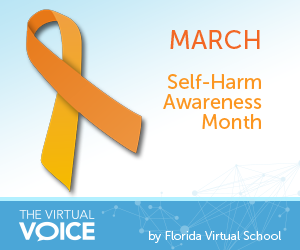Self-Injury Awareness Month
 March is Self-Injury Awareness Month.
March is Self-Injury Awareness Month.
Each year, approximately 2 million cases of self-injury are reported annually in the United States. One in five females and one in seven males engage in self-injury. Ninety percent of people who engage in self harm begin during their teenage or pre-adolescent years.[1]
Self-harm can be a way of coping with problems. It may help express feelings that can’t be put into words, serve as a distraction from life, or release emotional pain. Afterwards, one might feel better—but only for a little while. Although self-harm may give temporary relief, it comes with a cost. In the long term, it causes far more problems than it solves. By not learning healthy ways to deal with emotional pain, it increases risk for bigger problems down the line, including major depression, drug and alcohol addiction, and suicide.
Self-injury can be hard to detect as many people hide their injuries, however, there are red flags you can look for. Warning signs may include:
• Unexplained wounds or scars from cuts, bruises, or burns, usually on the wrists, arms, thighs, or chest.
• Blood stains on clothing, towels, or bedding; blood-soaked tissues.
• Sharp objects or cutting instruments, such as razors, knives, needles, glass shards, or bottle caps, in the person’s belongings.
• Frequent “accidents.” Someone who self-harms may claim to be clumsy or have many mishaps, in order to explain away injuries.
• Covering up. A person who self-injures may insist on wearing long sleeves or long pants, even in hot weather.
• Needing to be alone for long periods of time, especially in the bedroom or bathroom.
• Isolation and irritability.
Remember, you don’t have to have proof in order to reach out to someone you’re worried about. If you think someone is self-harming:
• Remain calm and caring, avoid panic
• Offer support, avoid judgment.
• Listen with compassion, but DO NOT let them recount the injuring experience, rather share the emotion that triggered it.
• Do get appropriate help for him or her from a qualified mental health professional.
If you’re ready to get help for self-harm, the first step is to confide in someone. If you’re not sure where to turn, call the S.A.F.E. Alternatives information line at 800-366-8288 for referrals and support for self-harm. With help, you can figure out why you hurt yourself and develop better coping strategies. If you’re feeling suicidal and need help right now, call the National Suicide Prevention Lifeline in the United States at 800-273-8255.
[1] Resources: HelpGuide.org and HealthyPlace.com

 Amy LaGrasta, Flex School Counseling Senior Manager, helps students make informed decisions about courses, career and college options, and the study habits needed for online success. Prior to joining FLVS, she served as the guidance director at Estero High School in Lee County, FL where she was honored with the Teacher of Distinction award.
Amy LaGrasta, Flex School Counseling Senior Manager, helps students make informed decisions about courses, career and college options, and the study habits needed for online success. Prior to joining FLVS, she served as the guidance director at Estero High School in Lee County, FL where she was honored with the Teacher of Distinction award.